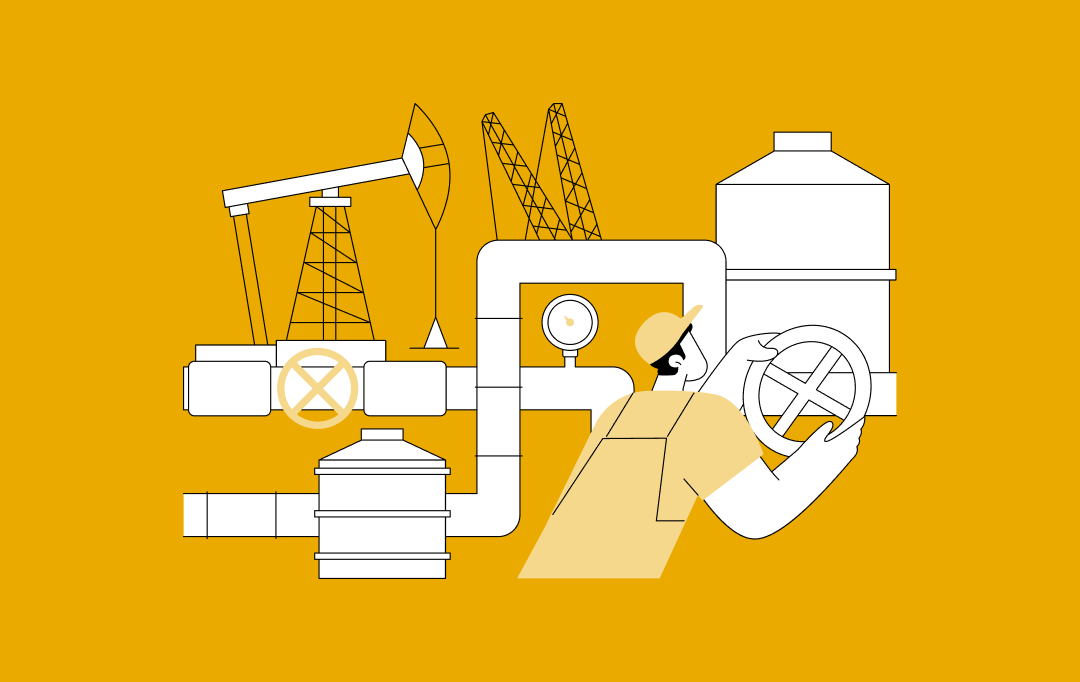- Benefits of Implementing ERP for the Oil and Gas Industry
- Improved Operational Efficiency
- Enhanced Collaboration Across Departments
- Reduced Operational Costs
- Better Compliance with Regulations
- Predictive Analytics for Improved Productivity
- Customer Satisfaction
- Project Management
- Examples of ERP Integration for the Oil and Gas Industry
- IoT Devices
- SCADA Systems
- GIS and Mapping Software
- CRM Platforms
- Computerized Maintenance Management Systems
- Document Management Systems (DMS)
- Health, Safety, and Environment (HSE) Management
- Human Resource (HR) Management
- Electronic Data Interchange (EDI)
- Communication Tools
- Core Features of ERP for Oil and Gas
- Asset Management
- Supply Chain Management
- Financial Management
- Human Resource Management
- Real-Time Analytics and Reporting
- Process of ERP Integration for the Oil and Gas Software
- Requirement Gathering and Analysis
- Vendor and Platform Selection
- Integration Approach Selection
- Customization of ERP Systems
- Maintenance and Evolution of the System
- Cost to Integrate ERP for the Oil and Gas Industry
- Why Choose Appinventiv for Oil and Gas ERP Software Integration Services
- FAQs
The oil and gas industry operates in a complex and volatile environment. It involves oil and gas exploration, extraction, drilling, production, and transportation. Consequently, the industry faces several challenges, such as fluctuating market demands, stringent regulatory requirements, and the constant pressure to reduce greenhouse gas emissions.
Notably, oil and gas production, transport, and processing contribute to nearly 15% of global energy-related greenhouse emissions, highlighting the industry’s environmental impact. Additionally, the industry grapples with a significant labor shortage, with a steady decline in the available workforce over the past decade.
To overcome these challenges, businesses turn to AI-powered oil and gas. ERP systems integrate various business processes into a single platform, providing a holistic view of your organization to enhance efficiency and decision-making.
66% of organizations report that their ERP systems have improved operational efficiency, and 62% have experienced cost reductions, particularly in purchasing and inventory management. Unsurprisingly, by adopting oil and gas ERP software, businesses can increase their ROI and achieve sustained success.
Let’s delve deeper into ERP’s key features and benefits for the oil and gas industry. We will also explore the integration process and highlight areas where ERP integration can significantly impact. So, without further ado, let’s get started.
Don’t sleep on this—level up your oil and gas ops now! Hit us up for a seamless ERP integration and make your operations smoother than ever.
Benefits of Implementing ERP for the Oil and Gas Industry
ERP software for the oil and gas industry is no longer an option but a dire necessity that offers many benefits and addresses the challenges of this complex sector. Here are the most remarkable benefits of ERP for the oil and gas industry.

Improved Operational Efficiency
The oil and gas sector involves a labyrinth of interconnected processes: exploration, production, transportation, and even distribution. ERP systems streamline these workflows by integrating data and automating routine tasks. Companies that adopt ERP to optimize their supply chain experience a 20% reduction in logistics costs and a 30% increase in operational efficiency.
Enhanced Collaboration Across Departments
ERP systems break down silos by creating a unified platform for communication and data sharing. It centralizes data across supply chain management, project management, finance, accounting data through ERP accounting software , and field operations. This unified approach facilitates seamless collaboration between teams.
Reduced Operational Costs
Custom cloud ERP integration for oil and gas streamlines operational processes and optimize resource allocation, which can lead to significant cost savings. From inventory management to asset utilization, the financial impact of ERP is measurable and impactful. For example, Shell’s implementation of cost-cutting measures, including ERP solutions, is expected to reduce operational expenses by around $3 billion to $4 billion within 12 months.
Better Compliance with Regulations
Maintaining regulatory compliance related to safety and environmental impact in the oil and gas industry is a constant challenge, with penalties for non-compliance running into millions. Oil and gas ERP systems simplify this by providing automated tracking and reporting tools, helping organizations comply with regulatory requirements and avoid penalties.
Predictive Analytics for Improved Productivity
Real-time monitoring capabilities in ERP systems empower companies to monitor equipment health and detect issues before they escalate. Predictive analytics in oil and gas adds another layer by forecasting maintenance needs and operational risks. It helps reduce downtime and improve productivity.
Customer Satisfaction
ERP software development for the oil and gas industry improves transparency and responsiveness, which leads to higher customer satisfaction. With real-time updates on product availability, order tracking, and delivery timelines, companies can better meet customer demands.
Project Management
Large-scale projects in the oil and gas sector require meticulous planning and execution. ERP systems offer comprehensive tools for project planning, scheduling, budgeting, cost control, and risk management. It ensures that projects are completed on time without crossing the budget.
Examples of ERP Integration for the Oil and Gas Industry
Integrating oil and gas ERP systems with other tools and technologies is crucial to synchronizing data across departments and getting a comprehensive view of the organization. Here are some of the most common examples of oil and gas ERP software integration you should consider for business:

IoT Devices
IoT-enabled devices are extensively used in the oil and gas industry for pipeline monitoring, asset tracking, and safety management. ERP-IoT integration provides round-the-clock visibility into operational activities and facilitates seamless data flow. It enables real-time analytics and automated alerts, notifying managers about taking proactive actions for asset management, such as pipeline leaks or equipment malfunctions.
Related Article: IoT in Oil and Gas: Revolutionizing Businesses
SCADA Systems
Supervisory Control and Data Acquisition (SCADA) systems monitor and control real-time operations in oilfields, pipelines, and refineries. Integrating ERP with SCADA enables real-time data sharing, enhancing decision-making and predictive maintenance capabilities. For instance, connecting SCADA data with ERP can automate maintenance schedules based on asset performance metrics.
GIS and Mapping Software
Geographic Information Systems (GIS) are essential for exploration, drilling, and resource management. When integrated with ERP, GIS provides spatial data that supports project planning, resource allocation, and environmental compliance.
CRM Platforms
When connected to ERP systems, customer Relationship Management (CRM) platforms can better manage customer interactions, contract management, sales pipelines, and service requests. This integration provides a unified view of client interactions, which helps companies maintain long-term relationships with customers, enhance their experience, and drive revenue growth.
Also Read: A Step-by-Step Guide to Successful CRM Implementation
Computerized Maintenance Management Systems
Integration of ERP with CMMS (Computerized Maintenance Management Systems) enables centralized tracking of maintenance activities and labor scheduling. This ensures assets are serviced on time and the purchase orders are placed on time, extending equipment lifespan and reducing downtime.
Document Management Systems (DMS)
A DMS integration allows centralized storage and retrieval of critical documents, such as compliance reports, permits, and contracts. This ensures efficient regulatory compliance adherence, secure document handling, and improved collaboration.
Health, Safety, and Environment (HSE) Management
Integrating HSE management tools with ERP helps companies monitor compliance with safety standards and environmental regulations. This integration enables real-time incident tracking, risk assessments, and reporting. For instance, HSE integration with ERP can automatically log and analyze workplace incidents. It ensures swift and proactive actions.
Human Resource (HR) Management
Integrating oil and gas ERP software with HR management systems helps centralize employee data, streamlining payroll, training, and workforce management. ERP-HR integration also facilitates compliance with labor laws and improves talent management strategies.
Electronic Data Interchange (EDI)
EDI integration allows ERP systems to securely exchange electronic business documents, such as invoices and purchase orders, with trading partners. This reduces paperwork, enhances transaction speed, streamlines order fulfillment, and ensures data accuracy.
Communication Tools
Integrating ERP with communication platforms like Microsoft Teams or Slack facilitates seamless collaboration across departments and remote teams. This integration enables the ERP system to share updates and critical documents directly to communication channels, making interdepartmental communication easier and more efficient.
Our cutting-edge ERP solution lives across 7 IKEA stores in the UAE, taking their operations from zero to hero.
Core Features of ERP for Oil and Gas
Custom ERP solutions for the oil and gas industry incorporate several essential features to function optimally. Here is a list of must-have features defining smooth ERP functionality for oil & gas.

Asset Management
Managing high-value assets in the oil and gas sector is critical for operational efficiency. Oil and gas ERP software offers advanced asset monitoring, maintenance scheduling, and management functionality to extend the lifespan of equipment.
According to a Deloitte report, poor maintenance strategies can lower a company’s productive capacity by 5% to 20%, while unplanned downtime costs industrial manufacturers approximately $50 billion annually.
Supply Chain Management
Efficient supply chain operations are essential for minimizing disruptions in the oil and gas industry. ERP for oil and gas provides end-to-end visibility across procurement, inventory, and logistics, enabling faster decision-making.
Financial Management
With fluctuating oil prices, having accurate financial oversight is imperative for organizations. ERP solutions offer tools for budgeting, forecasting, and real-time financial reporting, which empower companies to align their financial strategies with business objectives.
Human Resource Management
Managing a workforce spread across remote locations and various geographies is complex. ERP software for the oil and gas industry centralizes HR operations, including recruitment, payroll, and performance management. Many businesses utilize ERP to streamline HR functions for their global workforce.
Real-Time Analytics and Reporting
Real-time insights are invaluable for proactive decision-making. Custom ERP software for oil and gas operations provides advanced dashboards and analytics tools to monitor KPIs like production output, resource allocation, and market trends. It ensures businesses have critical data from different departments at their fingertips, helping them make informed decisions.

Process of ERP Integration for the Oil and Gas Software
ERP software must seamlessly integrate with existing systems, IoT devices, and third-party platforms to deliver optimal functionality. This phase involves migrating data from existing systems, configuring the system for ERP integration, and training users on how to use the system. Integrating ERP into the existing operations involves a structured approach that goes through several stages to ensure seamless ERP functionality for oil and gas. Here is a step-by-step ERP integration process in the oil and gas industry.

Requirement Gathering and Analysis
The first step of the ERP integration process in the oil and gas starts with conducting thorough research and understanding the unique needs of the organization. It involves detailed discussions with stakeholders to identify pain points, regulatory requirements, and workflow inefficiencies.
Vendor and Platform Selection
Choosing the right ERP software for the oil and gas industry is a critical business decision. When selecting the right ERP systems, you typically have two choices – oil and gas ERP software development from scratch or customization of off-the-shelf software. Building from scratch offers unmatched flexibility but requires significant time and resources. On the other hand, customizing a pre-built solution is faster and cost-effective but may come with limitations.
Integration Approach Selection
Once the requirements are clear and you have decided on the right ERP software to meet your business objectives, the next step is to choose the right approach for integration. You can choose to integrate oil and gas ERP software with an in-house team, hire freelancers, or outsource oil and gas ERP software integration services. However, outsourcing the integration requirements to a reputed ERP software for oil and gas companies in the Middle East is the best option.
Customization of ERP Systems
Customization aligns the ERP software with the organization’s specific workflows. For example, companies might require tailored modules for pipeline monitoring, predictive maintenance, or environmental compliance tracking. You can outsource oil and gas ERP customization services to adapt the oil and gas ERP systems per your specific needs.
Maintenance and Evolution of the System
Once implemented, the ERP system requires ongoing maintenance to stay functional and relevant. This involves regular updates to address bugs, improve security, and incorporate new features. Over time, as business needs evolve, the ERP systems also require upgrades or integration with emerging technologies like artificial intelligence and blockchain for enhanced capabilities.
Let Appinventiv power up your operations with seamless workflows, boosted efficiency, and the true potential of ERP systems.
Cost to Integrate ERP for the Oil and Gas Industry
ERP software integration cost for the oil and gas industry typically ranges from $30,000 to $300,000 or more, depending on various factors. Key determinants include the complexity of features, tech stack selection, scalability requirements, level of customization, number of integration with existing systems, location of ERP software experts, etc.

Additionally, the choice between in-house integration, outsourcing skilled professionals, or hiring freelancers also impacts the overall ERP software integration cost. Furthermore, post-launch support and regular maintenance requirements also contribute to the costs, which typically amount to 15-20% of the development expenditure annually.
Here is a table outlining the ERP software integration cost and timeline:
| App Complexity | Average Cost | Average Timeline |
|---|---|---|
| Simple ERP with minimal integration (e.g., single module) | $30,000-$50,000 | 4-6 months |
| Medium complex ERP system with multiple modules and moderate integration | $50,000-$120,000 | 4-9 months |
| Advanced ERP platform with complex integration and custom features | $120,000-$300,000 or more | 9 months to 1 year or more |
Why Choose Appinventiv for Oil and Gas ERP Software Integration Services
Developing and integrating ERP software for oil and gas is a complex process that requires an in-depth understanding of emerging technologies, industry-specific requirements, and operational intricacies.
Therefore, when looking to integrate ERP for oil and gas, you should consider outsourcing a reliable tech partner who not only ensures seamless integration of ERP with your existing systems but also aligns with your unique business needs and maximizes operational efficiency. And that’s the right combination you will find at Appinventiv.
As a leading provider of oil and gas software development services, we specialize in developing and deploying tailored solutions to address the dynamic challenges of the industry.
- With a proven track record of delivering 300+ successful projects across 35+ industries, including oil and gas, we excel in integrating ERP systems with advanced technologies like IoT, CRM, SCM, and real-time analytics.
- Our team of 1600+ tech experts ensures a seamless integration process that optimizes your ERP’s performance, enhances compliance, and improves decision-making capabilities. Whether modernizing legacy systems or implementing new technologies, we ensure your systems work harmoniously to drive measurable outcomes.
Partner with us to unlock the full potential of ERP systems in your oil and gas operations and achieve unparalleled efficiency and scalability.
FAQs
Q. What is the ERP system in oil and gas?
A. ERP solutions for the oil and gas industry are centralized software that integrates various business processes into a single platform. It integrates data from multiple departments, such as field operations, supply chain, finance, accounting, and project management, to give a 360-degree view of your organization. It enables real-time analytics, improves decision-making, and drives operational efficiency to address the business’ unique challenges.
Furthermore, ERP for oil and gas empowers companies to navigate the complexities of upstream and downstream oil and gas while adhering to the industry’s essential compliances and improving data accuracy.
Q. How long does it take to build oil and gas ERP software?
A. The timeline required for oil and gas ERP software development ranges from 4 months to 1 year or more, depending on several critical components. These include the features’ complexity, customization level, number of integrations with existing systems, and the chosen development approach. Share your project requirements with us for a more accurate timeline tailored to your needs.
Q. What is the oil and gas ERP software development cost?
A. Oil and gas ERP software development cost ranges between $30,000 to $300,000 or more, depending on several factors, including the project’s complexity, integration requirements, location of ERP developers, and so on. Discuss your project idea with us and get a tailored quotation to get a more accurate estimate for ERP software development for oil and gas.



Leveraging ERP AI Chatbot: Key Benefits and Strategies to Implement for Enterprises
In the current fast moving business ecosystem, companies are constantly looking for innovative ways of streamlining their operations and getting a competitive edge. One tool they have been relying on as a trusted mode of achieving this goal is an enterprise resource planning (ERP) software. The ERP software domain, in response, has emerged as a…

How ERP eCommerce Integration Can Help Scale Your Business to New Heights
Operating an eCommerce business is a complex process that requires effective management of multiple interconnected components. This includes various activities such as planning and allocation of resources, inventory management, internal communications, etc. What makes eCommerce operations even more challenging is that each area often operates within separate systems, having its unique set of processes. Thus,…

Why Automotive ERP Software Is Your Business's Necessity - 10 Use Cases And Examples
An Enterprise Resource Planning (ERP) system is an indispensable tool that integrates all the aspects of your enterprise into a single system, eliminating the concerns about software maintenance and data consideration. Almost every industry is now utilizing custom ERP software to streamline their operations, and the automotive sector is no exception. A custom automotive ERP…


















